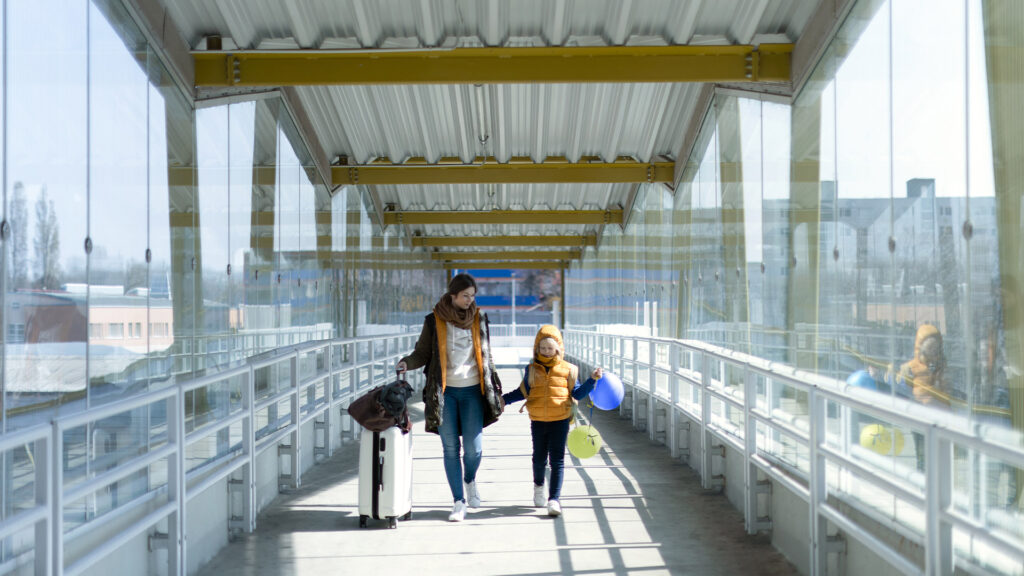Site uses cookies.
Learn moreDisplacement and health: 'The anti-immigrant rhetoric needs to stop'
11 August 2022

Millions of refugees around the world struggle to have their healthcare needs met. Why is that so, and what are the risk factors that threaten their…
Fleeing threats in your home country, surviving a journey that few can imagine, then, finally, if you are lucky, reaching a country you hope will welcome you. This is the reality for many refugees. But what then? A new World Health Organization report has concluded that many migrants and refugees face poorer health outcomes than local populations. We investigate why health systems must change to meet the needs of a world on the move.
Why do refugees’ healthcare needs often remain unmet? Image credit: Halfpoint Images/Getty Images.
War in Ukraine, civil war in Syria, unrest and persecution in Afghanistan — these are just a few of the situations leading people to leave their countries of origin.
According to the World Health OrganizationTrusted Source (WHO), worldwide, more people are on the move than ever before.
But what happens when they reach a country where they hope to be safe? For some, asylum will be granted and they will be made welcome, as evidenced by the efforts with Ukrainian asylum seekers in both the United States and Europe.
For others, uncertainty and a long battle to prove refugee status and gain asylum will follow. During this time, they may struggle to access healthcare, leading to the “poorer health outcomes” described in the WHO report.
Escaping trauma
Few people willingly leave their home country, but circumstances sometimes make staying there impossible. War, natural disasters, discrimination, and persecution are some of the reasons people have to leave, all of which may leave mental and physical scars.
To be able to undertake what is almost certain to be an arduous journey, most migrants are, according to the WHO report, innately healthy. Indeed, many will start their journey healthier than the host population in their destination country.
However, the WHO report found that:
“Refugees and migrants often experience poor living and working conditions during departure, transit or on arrival in host countries and, therefore, face additional barriers to receiving timely diagnosis, treatment and care, which might increase the prevalence of diseases among them.”
If they survive long overland journeys and hazardous sea crossings, many migrants then spend long periods in transit camps or containment centers en route to a safe destination.
Conditions in these centers may be harsh, with many unable to provide adequate healthcare for all those who stay there. This, inevitably, leads to the deterioration of health for many.
Charities such as Médecins Sans Frontières (MSF) and other non-governmental organizations provide healthcare for some, but they cannot do so for all migrants.
A recent report from MSF on conditions in containment centers on Greek islands identified “significant systematic and structural gaps in the provision of essential and urgent healthcare for asylum seekers, refugees, and migrants.”
Women in transit
For women, conditions can be particularly challenging.
Around 25%Trusted Source of female migrants are of reproductive age, so reproductive health is a key concern. The WHO report identifies several issues in this area, including lack of antenatal care, malnutrition, and anemia in mothers and children during migration.
Dealing with menstruation during transit carries a huge burden as well, particularly for women from cultures where menstruation is a taboo topic.
A 2020 Oxfam report identified a lack of menstrual hygiene materials (MHM) and a “lack of adequate, accessible, safe and private spaces” to change and dispose of MHM as key problems for Syrian refugee women in camps in the Bekaa valley in Lebanon.
Another issue with the lack of privacy is that women may be reluctant to use facilities because of the risk of experiencing sexual harassment and violence.
And this fear is not unfounded — one 2015 study found that up to 69.3% of female migrants had experienced some form of sexual violence since reaching Europe.
The risks are greatestTrusted Source for those women and children who migrate without family or social networks to protect them.
A healthy destination?
Those fortunate enough to reach their destination country may arrive in good health, but that health may not always last. Dr. Luz Garcini, assistant professor at Rice University, Texas, spoke to Medical News Today about the situation of migrants coming into the U.S.
“Immigrants — the ones that are able to endure such hardship trips — they come in better health than U.S.-born citizens. Eventually, the longer time they spend in the U.S., the worse their health becomes. I think it’s due to the stress […] we break them down.”
So to maintain that health, they must try to access healthcare. According to the Refugee Council, access to healthcare is a basic right, yet many migrants find that accessing healthcare in their destination is far from straightforward.
In the United Kingdom, refugees and asylum seekers are fully entitled to free National Health Service (NHS) care. Refused asylum seekers, however, are only entitled to some aspects of NHS care, such as emergency care. The complicated rules create uncertainty and distress.
Helen Kidan, volunteer coordinator at BHN, a charity working with asylum seekers in Bristol, U.K., told MNT about some of the issues faced by asylum seekers there.
“The effects of the hostile environment in the U.K. [have] meant that a lot of asylum seekers and refugees are worried to register with GP [primary care] surgeries due to their immigration status and concerns about paying for medical assistance,” she noted.
“GP surgeries have also refused registration to refused asylum seekers in the [mistaken] belief that they are not allowed to be registered,” Kidan added.
The situation in the U.S. is similar. Many migrants, particularly those who are undocumented, can access only minimal healthcareTrusted Source. Dr. Garcini explained that while emergency healthcare is available for immigrants, unauthorized persons are not entitled to care for chronic conditions.
“Say they have chronic kidney disease that requires multiple dialysis treatment — they cannot get access to it. […] So they may have to choose to return to their home country that they left years ago, where they have no one left and the healthcare systems are crumbling. […] And they are not in a condition to travel,” she told us.
“We definitely have a broken immigration system. […] The healthcare system is definitely not ready for it. In many ways. In terms of accessibility but also in terms of the providers being prepared to address the needs.”
– Dr. Luz Garcini
The impact of COVID-19
“The COVID-19 pandemic has once again shown that the health of refugees and migrants and their host communities cannot be protected and promoted if refugees and migrants are not included in national public health strategies, including preparedness and response.”
– WHO report
Refugees and migrants have faced a disproportionate burden of disease due to COVID-19. Vaccine hesitancy among some groups is also an issue.
Some countries, such as Portugal, are providing vaccination to refugees and migrants regardless of status. But many fear that coming forward for vaccination might bring them to the notice of immigration services.
“It’s not that they don’t want it [the vaccination], but they are afraid of the consequences, […] of being separated from their families. Even from being returned. […] Survival wins over the risk of disease.”
– Dr. Luz Garcini
Mental health
For those lucky enough to avoid physical ailments as a result of migration, there will be mental stresses unimaginable to those who have not undergone these experiences.
The UCL–Lancet Commission on Migration and HealthTrusted Source had this to say:
“Even in the best possible conditions, migration is stressful and most people move in ways that are far from ideal; the stress of migration, travel conditions, and the causes that prompted migration in the first place, can all adversely affect mental health.”
Traumatic events in their homelands are often the drivers of migration. Add to this the traumas of an, often prolonged, journey to their destination, and many migrants will show symptoms of mental health issues.
According to the WHO report, depression and post-traumatic stress disorder (PTSD) are common, and these conditions, along with anxiety, are particularly prevalent among younger migrants.
Dr. Garcini has seen this in the U.S.
“Many children had trauma and tremendous amounts of distress, but when you talk to the kids, they will deny any of that — ‘I’m strong, I can work.’ […] Immigrants are hiding their distress […] trying to appear strong enough so that they are not a burden. […] [T]hat adds to the complications,” she told us.
And access to mental health services is, like all healthcare, difficult for those without settled status in a country. Kidan commented that “[m]any asylum seekers suffer from different levels of PTSD, and this impacts on their lives, but many go undiagnosed as they have not sought medical help.”
“Mental health issues also remain a stigma in many of the asylum-seeking communities and this creates a barrier, therefore health practitioners also need to understand the cultural barriers,” she added.
Even if they are entitled to mental health services, accessing them in many countries can be tricky, as Dr. Garcini explained: “There’s a general mental health crisis in the U.S. Trying to get access is difficult. […] This has created a hostile anti-immigrant environment.”
Anti-migrant rhetoric
The WHO report states that migrants are often unwilling to access, much needed, health services because of anti-migrant discourse and fear of deportation, particularly irregular migrants and asylum seekers who lack official documents.
The anti-migrant discourse has increased in many countries. A 2022 KFF report stated that “changes to immigration policy enacted during the Trump administration contributed to increased fears among immigrant families about participating in programs and seeking services, including health coverage and care.“
Worldwide, healthcare services are under huge pressure, partly as a result of the COVID-19 pandemic. In the U.K., a recent BMA analysis found that almost 39,000 nursing places are unfilled, and to reach the OECD EU average, the U.K. would need to recruit the equivalent of 46,300 full-time doctors.
When resources are scarce, people do not wish to share them with “outsiders.”
“The anti-immigrant rhetoric needs to stop. It has done so much damage to these communities. They have been portrayed as a burden to the system, as a threat to society, as terrorists that are coming into the country, as a health risk, as carriers of disease. You can imagine what that does to a person.”
– Dr. Luz Garcini
The way forward
“Fundamentally, collective action will require greater political dedication and the necessary resources to ensure that policies for health systems and services include refugees and migrants, regardless of their legal status. In the long run, the ‘othering’ of refugees and migrants needs to be reduced and eventually removed to avoid ‘us versus them’ discussion in policy-making and society at large.”
– WHO report
The number of migrants is increasing worldwide and, with growing instability in many countries, it looks set to continue rising. Currently, there is a dearth of good quality data, meaning that refugees are largely invisible. If they are unseen, they cannot be cared for.
Failure to reorient health systems to include migrants and refugees denies the basic right of healthcare to many.
While some countries trusted Sources, such as Costa Rica, Thailand, and Spain, are moving toward fully inclusive policies, many are not. These countries have shown that healthcare systems that cater to all require political will.
As many countries tighten their immigration policies, we would do well to remember that, as the 2018 Lancet commission trusted Source noted: “Migrants generally contribute more to the wealth of host societies than they cost.”
Article Source: https://www.medicalnewstoday.com/articles/displacement-and-health-the-anti-immigrant-rhetoric-needs-to-stop#The-way-forward



